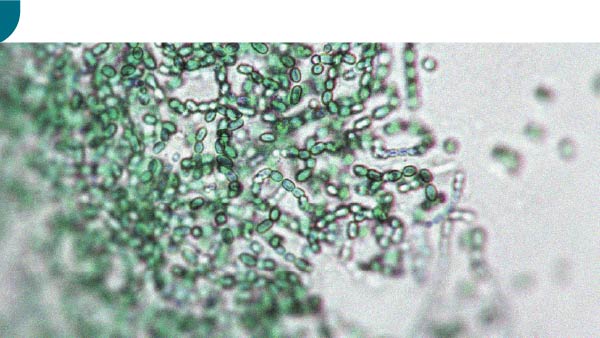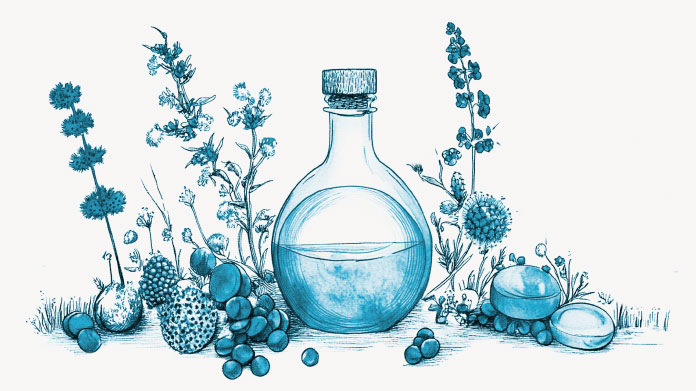Could your stomach ache be caused by the bacteria Helicobacter pylori?
Have you heard of the bacteria Helicobacter pylori? Perhaps not, as awareness of this pathogen is far from widespread, despite it being responsible for many cases of stomach ache. Indeed, around 50% of us may be harbouring this germ which is believed to be the principal cause of gastro-duodenal ulcers.

Where does Helicobacter pylori grow?
For a long time, it was thought that no bacteria could survive the acidity of the stomach. However in 1982, two Australian scientists were surprised to discover that the bacteria Helicobacter pylori (H. pylori) was indeed able to withstand the effects of gastric juices. This bacteria forms part of the Helicobacter genus because of its external, corkscrew-like, helicoidal structure. The term pylori refers to the pylorus where the stomach meets the small intestine.
How does Helicobacter pylori survive in the stomach?
The scientists who discovered Helicobacter pylori in the human stomach were actually awarded the Nobel prize for physiology and medicine in 2005. Following this major advance, further research has expanded our understanding of the mechanism responsible for its development. Its very specific structure means it is able to penetrate the stomach’s mucus and mucosa. Once there, H. pylori produces significant amounts of an ammonia-producing enzyme called urease, which enables it to survive in the gastric mucosa.
What are the consequences of H. pylori infection?
As well as secreting urease, Helicobacter pylori produces toxins which damage the stomach, weakening the gastric mucosa and leaving it vulnerable to attack by gastric juices. They may also increase gastric acid production which encourages the development of chronic inflammation in the stomach, manifesting in frequent stomach pain.
What is the risk of complications from H. pylori infection?
In some cases, the gastritis caused by H. pylori can result in a gastroduodenal ulcer, a deep lesion in the stomach wall (gastric ulcer) or intestinal wall (duodenal ulcer). Helicobacter pylori infection is now considered the leading cause of gastroduodenal ulcers. In rare cases, it can contribute to the development of stomach cancer (gastric adenocarcinoma).
Who is affected by this infection?
It’s estimated that half the world’s population may be infected by the bacteria H. pylori. Though contamination happens more frequently in childhood, Helicobacter pylori infection can remain asymptomatic and undiscovered for many years. A significant number of people are thus living with this bacteria without realising it.
How do you recognise and diagnose infection by H. pylori ?
It can be difficult to diagnoseHelicobacter pylori infection - medical tests are needed to confirm the presence and growth of this bacteria. There are, however, certain warning signs such as persistent, increasingly frequent stomach aches, abdominal pain accompanied by bloating, and nausea with loss of appetite.
How is H. pylori infection treated?
Helicobacter pylori is normally treated with antacid-based triple therapy, aimed at reducing gastric acid production and limiting damage to the gastric mucosa. This tritherapy usually includes a proton pump inhibitor (PPI) and two antibiotics. In some cases, quadri-therapy with a PPI and three antibiotics may be used. Unfortunately, more and more cases of antibiotic resistance are being reported. The bacteria H. pylori is mutating and becoming resistant to antibiotics.
Are natural treatments available?
In view of this growing antibiotic resistance, a number of studies have highlighted the benefits of natural treatments for combatting gastritis and ulcers. Widely-studied, liquorice extractHelicobacter pylori: mastic gum. This natural gum has been used for thousands of years as a remedy for stomach aches and as an antiseptic. Studies show that this extract may inhibit or kill certain bacteria, including H. pylori.
How can you prevent infection by H. pylori?
The above-mentioned liquorice extract and mastic gum can also be used in a preventive capacity. Their activity is particularly useful in helping to protect the gastric mucosa from attack by H. pylori. Improving digestive transit may also be beneficial for prevention given that good digestive transit encourages the elimination of toxins including those produced by Helicobacter pylori. Alongside a balanced diet and healthy lifestyle, certain dietary supplements can help to maintain good digestive transit. One such supplement is psyllium seed husk, which contains a large quantity of soluble fibre, and probiotics, microorganisms recognised for their beneficial effects on the digestive system.
Keywords
3 Days
Quality products
Quality products , efficient and effective customer service. You can’t ask more
CLaudia
9 Days
Good quality product and customer service.
So far, I'm liking this product, and the customer service was very good.
ELZL
16 Days
The products I use are excel·lent
The products I use are excel·lent
ROSAS Josep Maria
24 Days
Delivery is prompt and I never saw a…
Delivery is prompt and I never saw a quality problem with the manufacturing. It is not possible to assess efficacy on a personal basis, since too many factors come into play. Efficacy can only be assessed statistically with a sufficient number of cases.
Roger De Backer
25 Days
I collaborates with the Supersmart…
I collaborates with the Supersmart more than 10 years. Every thing is going good. Quality of the things is good. Delivery comes in time. Five stars definitely !!!
Oleksiy
25 Days
All good
Simple, frictionless site, easy ordering, good delivery updates and execution.
Chris Robbins
27 Days
I feel better
I feel better
Peter Ammann
27 Days
Prompt delivery
Prompt delivery
JAKUB Radisch
28 Days
My new go-to for top quality supplements!
I am buying more and more of my supplements from this superb, high quality company. Cannot recommend it enough. Plus, excellent customer service with a quick, helpful team and speedy deliveries. Highly recommend Supersmart!
Cecilie H.
32 Days
SUPERSMART WHAT ELSE👍
SUPERSMART WHAT ELSE👍
DIEDERLE Christophe
35 Days
Excellent quality products with…
Excellent quality products with innovative formulas, as someone who has been suffering with acid reflux, these supplements have been lifesavers.
Oriana Moniz
35 Days
high quality supplement!
high quality supplement!
GALANT
36 Days
Good service prompt delivery
Good service prompt delivery
Mrs Marcella Reeves
40 Days
I like your clear explanation
I like your clear explanation. And how to make a choice of products for a specific health problem
Ingrid
47 Days
Great product and it arrives quickly.
Great product and it arrives quickly.
SOMMARIVA Gianni



